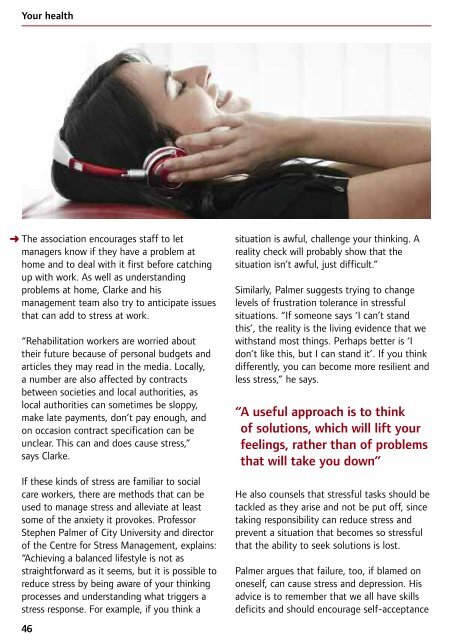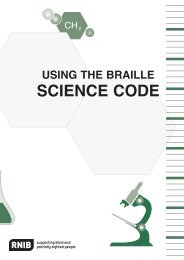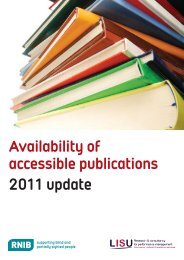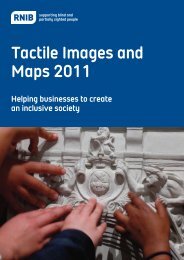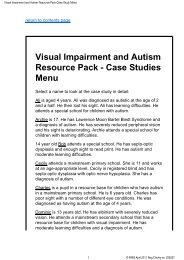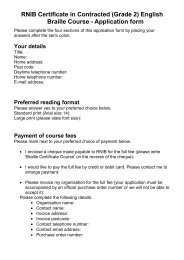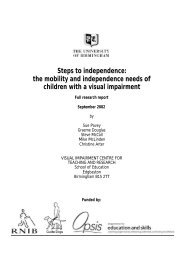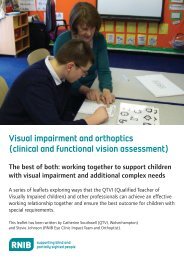Reflections on sight loss - RNIB
Reflections on sight loss - RNIB
Reflections on sight loss - RNIB
Create successful ePaper yourself
Turn your PDF publications into a flip-book with our unique Google optimized e-Paper software.
Your health<br />
➜<br />
The associati<strong>on</strong> encourages staff to let<br />
managers know if they have a problem at<br />
home and to deal with it first before catching<br />
up with work. As well as understanding<br />
problems at home, Clarke and his<br />
management team also try to anticipate issues<br />
that can add to stress at work.<br />
“Rehabilitati<strong>on</strong> workers are worried about<br />
their future because of pers<strong>on</strong>al budgets and<br />
articles they may read in the media. Locally,<br />
a number are also affected by c<strong>on</strong>tracts<br />
between societies and local authorities, as<br />
local authorities can sometimes be sloppy,<br />
make late payments, d<strong>on</strong>’t pay enough, and<br />
<strong>on</strong> occasi<strong>on</strong> c<strong>on</strong>tract specificati<strong>on</strong> can be<br />
unclear. This can and does cause stress,”<br />
says Clarke.<br />
If these kinds of stress are familiar to social<br />
care workers, there are methods that can be<br />
used to manage stress and alleviate at least<br />
some of the anxiety it provokes. Professor<br />
Stephen Palmer of City University and director<br />
of the Centre for Stress Management, explains:<br />
“Achieving a balanced lifestyle is not as<br />
straightforward as it seems, but it is possible to<br />
reduce stress by being aware of your thinking<br />
processes and understanding what triggers a<br />
stress resp<strong>on</strong>se. For example, if you think a<br />
46<br />
situati<strong>on</strong> is awful, challenge your thinking. A<br />
reality check will probably show that the<br />
situati<strong>on</strong> isn’t awful, just difficult.”<br />
Similarly, Palmer suggests trying to change<br />
levels of frustrati<strong>on</strong> tolerance in stressful<br />
situati<strong>on</strong>s. “If some<strong>on</strong>e says ‘I can’t stand<br />
this’, the reality is the living evidence that we<br />
withstand most things. Perhaps better is ‘I<br />
d<strong>on</strong>’t like this, but I can stand it’. If you think<br />
differently, you can become more resilient and<br />
less stress,” he says.<br />
“A useful approach is to think<br />
of soluti<strong>on</strong>s, which will lift your<br />
feelings, rather than of problems<br />
that will take you down”<br />
He also counsels that stressful tasks should be<br />
tackled as they arise and not be put off, since<br />
taking resp<strong>on</strong>sibility can reduce stress and<br />
prevent a situati<strong>on</strong> that becomes so stressful<br />
that the ability to seek soluti<strong>on</strong>s is lost.<br />
Palmer argues that failure, too, if blamed <strong>on</strong><br />
<strong>on</strong>eself, can cause stress and depressi<strong>on</strong>. His<br />
advice is to remember that we all have skills<br />
deficits and should encourage self-acceptance


